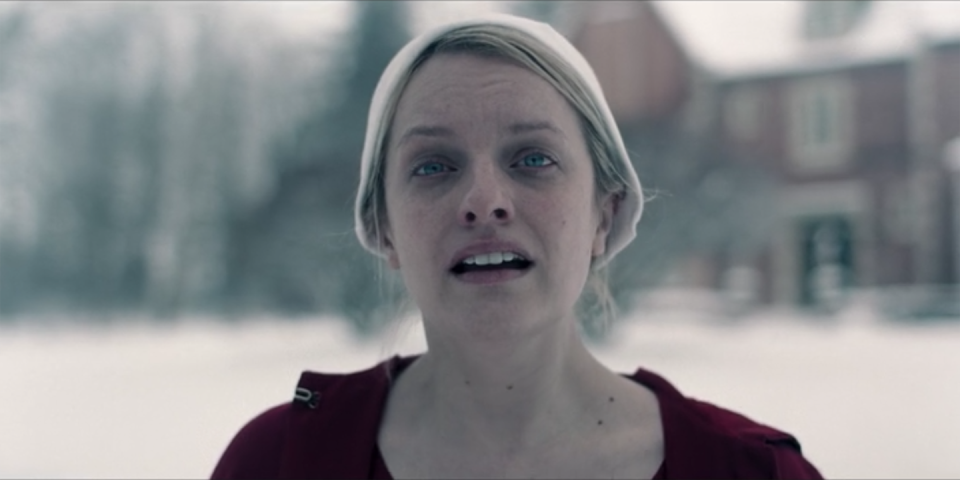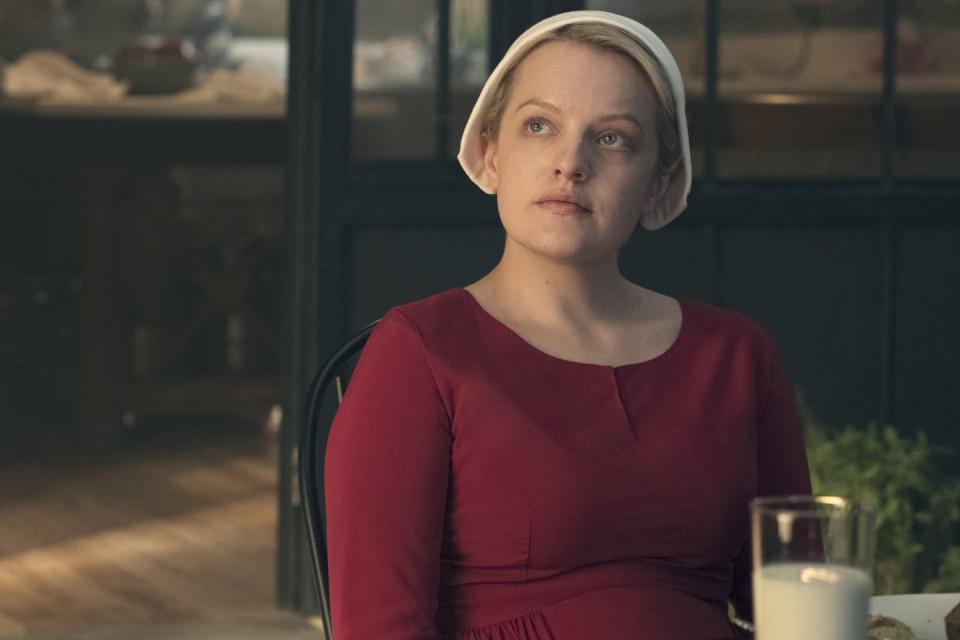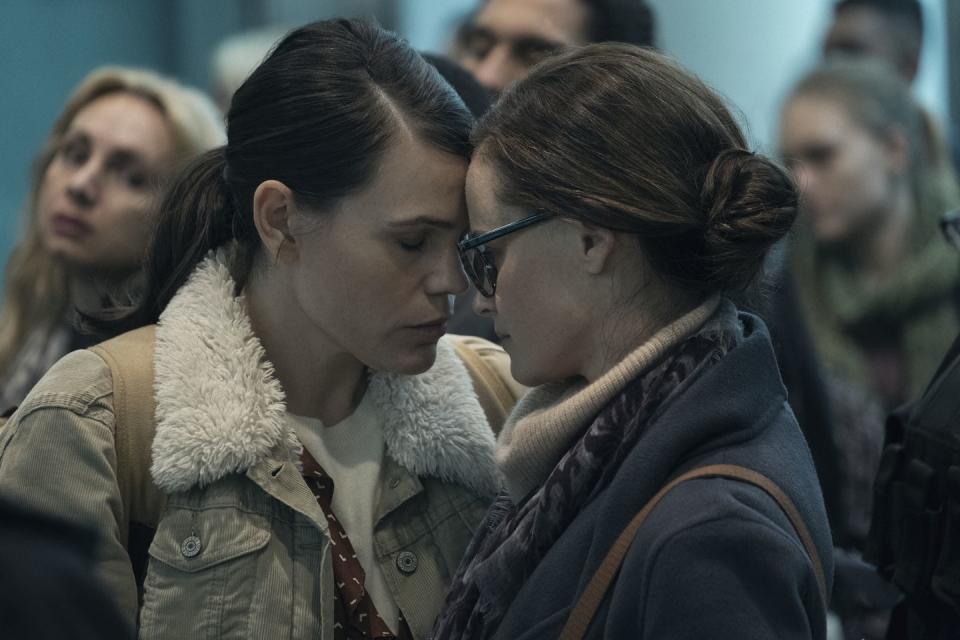'The Handmaid's Tale' Hits Eerily Close to Home

This post contains spoilers for this week's The Handmaid’s Tale season two episode, “The Last Ceremony.”
It happened, finally: June reunited with her daughter Hannah on this week’s episode of The Handmaid’s Tale, some three years after being torn apart in the forest when Gilead was beginning to form. The hitch: It only lasted 10 heartbreaking minutes. “Did it hurt? When they hit you on the head?” Hannah, who now goes by Agnes and has new parents, asks June, referring to one of her last memories of her mother. It’s a tough-to-watch scene that unfolds as the clock is ticking. You know they’re going to be separated again. You know Hannah will have new final memories of her mother, again.
Child separation is a recurring theme in Margaret Atwood’s dystopian bestseller and on the Hulu show, and it’s appeared in multiple forms: there’s Emily (Alexis Bledel) being separated from her wife and son at the airport in a flashback; June and Hannah’s separation in the forest pre-Gilead and at the abandoned house this week; Moira and the child she becomes pregnant with and gives to the couple in exchange for money in a flashback; Janine and the baby she has as a Handmaid for the Putnams. This is what gives Gilead life – the snatching of children from their parents. And it’s a twisted, horrific scene that has played out in real life in recent months in this country.
She won't stop. pic.twitter.com/XwH3x0zsTL
- The Handmaid's Tale (@HandmaidsOnHulu) June 20, 2018
On Wednesday, President Donald Trump signed an executive order to end his administration’s policy of separating migrant children from their parents who were detained for trying to enter the country illegally. But things look bleak. Families apprehended at the border will now be detained together. And per CNN, it’s still unclear what will happen to the 2,300 children who have since been relocated to foster homes far from the border.
“It’s incredibly disheartening to see this happening in America,” Yahlin Chang, who wrote “The Last Ceremony," said in a phone call Wednesday. “It’s something that I couldn’t have believed when I wrote the scenes in November or December,” adds Jeremy Podeswa, who directed the episode: “It’s definitely unexpected. None of us could have anticipated that happening.”
Below, Chang and Podeswa give a rundown on how they created June and Hannah’s heart-wrenching scene, the integral role Elisabeth Moss played, and what the conversation has been like among The Handmaid’s Tale family.
On watching June and Hannah’s separation happen in real life:
Chang: When I wrote the scene, I talked to social workers and child psychologists, and also an expert at the United Nations. The UN expert really helped me because this sort of scene plays out all the time in foreign countries, countries far away, countries where children and parents are ripped apart because of war and brutal dictatorial regimes. I talked about stuff that happened very far away, but stuff that would never happen here, that would never happen in America.
Podeswa: There’s something about Handmaid’s Tale which has been prescient from the very beginning. It’s just a weird fluke of the culture, what’s happening right now. The book was reflecting things that were happening in the world at that time, the series has been particularly timely, generally. But almost accidentally, reflecting things that are happening. This is one of the most eerie and unexpected mirrors to what’s happening in contemporary culture.

On trauma research:
Podeswa: Yahlin Chang spoke with child psychologists about the effects of trauma, the effects of separation on a child, what a reunion would look like, the distance, the caution, the reluctance to reengage, how a parent who’s been cut off from a child, how they reengage, what happens between the two of them over the course of this reunion… It became very traumatic.
Chang: When I wrote the scene, one of the things that one of the child psychologists told me was that Hannah would remember the last time she saw her mother. And the last time she saw her mother was when her mother was being ripped away from her by Guardians. The psychologist told me that she would be replaying that in her head every day. So when she asks June, “Did it hurt when they hit you on the head?” It hits June like a ton of bricks. Her poor daughter has been reliving that trauma in her head every day since they’ve been separated. And that is terribly destabilizing for Hannah. When you see the scene, you get the sense that Hannah’s not 100 percent OK. She’s been through some rough stuff. And it’s really heart wrenching. I have three kids. Just knowing how upsetting it is for me if they fall down and get hurt, you really feel for your children. It’s really hard for June and it’s a terrible situation. The separation will always be very a very unfortunate fact of existence in a tragedy. And something they’ll have to carry with them for the rest of their lives. These children are suffering and they will continue to suffer. I can’t believe that our government is doing this to them.
On filming June and Hannah’s scene:
Podeswa: The shoot was incredibly emotional. We discussed it in great detail before. I was very concerned about Lizzie [Elisabeth Moss] and the burden on her as an actor to carry this weight of emotion over the course of a few days of shooting. I wanted to work with her very carefully and how to calibrate that so she didn’t just cap out, which happens with almost anybody… As we were shooting, we found that it was easier for Lizzie to continue through more of it. She was in that emotional space. To keep shooting and keep carrying on until the next sequence was easier than breaking it up. We found ways to simplify the shooting so we could just keep rolling through the many different moments she has without stopping. That was the most effective.

On Elisabeth Moss:
Podeswa: When those scenes were being filmed, as a director, even, it was impossible for me to separate myself from what we were actually shooting. When I see Lizzie perform this and act it and feel it in such an epic way, you have to be moved. You can’t not be moved by what you’re seeing. What you’re filming is a Sophie’s Choice moment. You’re filming something that is completely heartbreaking and something that shouldn’t ever happen and yet you are creating this moment and she makes you believe it in a way that’s incredibly visceral. It was incredibly moving for me and for everybody watching it in the crew. All of our hearts were broken watching it. All of us were emotional. It was something-something unusual and very powerful.
Chang: You couldn’t ask for a better actress to act a scene you’ve written… it really shows the triumph of the human spirit that she sort of instantly snaps into being a mother to this child and caring for her and making sure that she feels safe and loved and making sure she knows that her mother will always be her mother and will never stop loving her. That, to me, it is heartening to see love triumph in those circumstances. That love can survive in those circumstances.
On the darkness of season two:
Chang: You know, Gilead is a pretty dark place. And it’s a nightmare scenario for sure. And yet, as Margaret Atwood has said, and as we do on the show too, we don’t make stuff up, really. Everything that happens to the characters on our show has happened to women in history, in real life: Misogyny, sexism, obsessive control over women’s bodies, that’s happened forever. We don’t make anything up. But it is incredibly depressing to have real world examples now of things that happened in the fictional dystopia. We wish that the world was further away from Gilead. We wish that there were fewer similarities. And stuff that was unimaginable happening in America, 2018, is happening, and that is really shocking.

On what The Handmaid’s Tale cast and crew have been talking about in wake of the family separation crisis:
Podeswa: [Moss] actually sent, I won’t divulge too much, but she sent around a beautiful e-mail to the creative people involved in this episode, thanking them and also noting the relevance of what we’re doing in this moment. Nothing’s lost on her. I don’t want to speak for her, [but] I would say that it’s a very powerful thing for her that this is being shown this week and in this moment.
Chang: We gathered to start season three discussions two weeks ago. So, we are actually all together, every day. Yeah, we do talk about it. We do talk about what to do in season three and we’re all horrified by these family separations. We actually just all donated to the causes of ending family separation. We wish that everything that we were talking about was made up and not real, for sure. It is very uncanny timing.

On how accurate season two has been:
Chang: What astounds me, given the recent news, is that in that scene when they’re separating Emily from her family, she’s told that she can’t go with her family because of “the law.” And she goes, “What law?” And that ICE guy says, “THE law.” Last week, Jeff Sessions said “It’s the law, it’s the law.” It’s really fucking unbelievable. And then using the Bible to justify it? That’s a page out of Gilead’s playbook. That is astounding to me that you would use that. It’s so craven that you would use the Bible to justify these family separations and that they’re actually doing that. It’s crazy because, have you seen The Handmaid’s Tale? Are you trying to act like the people from The Handmaid’s Tale?
You Might Also Like
